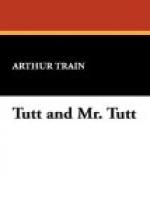“In the ‘Decay of Lying,’ Mr. Tutt,” said Tutt thoughtfully, as he dropped in for a moment’s chat after lunch, “Oscar Wilde says, ’There is no essential incongruity between crime and culture.’”
The senior partner removed his horn-rimmed spectacles and carefully polished the lenses with a bit of chamois, which he produced from his watch pocket, meanwhile resting the muscles of his forehead by elevating his eyebrows until he somewhat resembled an inquiring but good-natured owl.
“That’s plain enough,” he replied. “The most highly cultivated people are often the most unscrupulous. I go Oscar one better and declare that there is a distinct relationship between crime and progress!”
“You don’t say, now!” ejaculated Tutt. “How do you make that out?”
Mr. Tutt readjusted his spectacles and slowly selected a stogy from the bundle in the dusty old cigar box.
“Crime,” he announced, “is the violation of the will of the majority as expressed in the statutes. The law is wholly arbitrary and depends upon public opinion. Acts which are crimes in one century or country become virtues in another, and vice versa. Moreover, there is no difference, except one of degree, between infractions of etiquette and of law, each of which expresses the feelings and ideas of society at a given moment. Violations of good taste, manners, morals, illegalities, wrongs, crimes—they are all fundamentally the same thing, the insistence on one’s own will in defiance of society as a whole. The man who keeps his hat on in a drawing-room is essentially a criminal because he prefers his own way of doing things to that adopted by his fellows.”
“That’s all right,” answered Tutt. “But how about progress?”
“Why, that is simple,” replied his partner. “The man who refuses to bow to habit, tradition, law—who thinks for himself and acts for himself, who evolves new theories, who has the courage of his convictions and stakes his life and liberty upon them—that man is either a statesman, a prophet or a criminal. And in the end he is either hailed as a hero and a liberator or is burned, cast into prison or crucified.”
Tutt looked interested.
“Well, now,” he returned, helping himself from the box, “I never thought of it, but, of course, it’s true. Your proposition is that progress depends on development and development depends on new ideas. If the new idea is contrary to those of society it is probably criminal. If its inventor puts it across, gets away with it, and persuades society that he is right he is a leader in the march of progress. If he fails he goes to jail. Hence the relationship between crime and progress. Why not say that crime is progress?”
“If successful it is,” answered Mr. Tutt. “But the moment it is successful it ceases to be crime.”
“I get you,” nodded Tutt. “Here to-day it is a crime to kill one’s grandmother; but I recall reading that among certain savage tribes to do so is regarded as a highly virtuous act. Now if I convince society that to kill one’s grandmother is a good thing it ceases to be a crime. Society has progressed. I am a public benefactor.”




